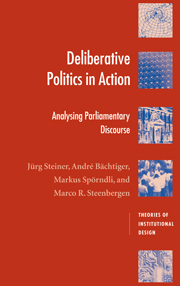Book contents
- Frontmatter
- Contents
- Acknowledgments
- Introduction: The research questions
- 1 Institutions and behavior: the example of consociational theory
- 2 The philosophical literature on deliberative politics
- 3 Measuring deliberation: a Discourse Quality Index
- 4 Understanding the real world of deliberation: hypotheses about antecedents and consequences
- 5 Antecedents of deliberation: institutions and issues
- 6 Discourse and its consequences
- Conclusion and research outlook
- Appendix: Discourse Quality Index (DQI): instructions for coders
- References
- Index
Introduction: The research questions
Published online by Cambridge University Press: 22 September 2009
- Frontmatter
- Contents
- Acknowledgments
- Introduction: The research questions
- 1 Institutions and behavior: the example of consociational theory
- 2 The philosophical literature on deliberative politics
- 3 Measuring deliberation: a Discourse Quality Index
- 4 Understanding the real world of deliberation: hypotheses about antecedents and consequences
- 5 Antecedents of deliberation: institutions and issues
- 6 Discourse and its consequences
- Conclusion and research outlook
- Appendix: Discourse Quality Index (DQI): instructions for coders
- References
- Index
Summary
This book is about deliberation in parliamentary institutions. It presents data on the institutional antecedents as well as the consequences of legislative deliberation in four countries: Germany, Switzerland, the United Kingdom, and the United States. Our goal is to connect the literature on deliberation, which has developed almost exclusively within the field of political philosophy, to a theoretical and empirical understanding of political institutions. Our main argument will be that talk matters: the nature of speech acts inside legislatures is a function of institutional rules and mechanisms, and bears an influence on political outcomes that transcends those rules and mechanisms. Our main vehicle of analysis is a Discourse Quality Index (DQI), which measures the quality of deliberation.
To give a feeling for the empirical data to be presented in the main body of the book, we open with two illustrations, one of a high quality of deliberation and one of a low quality of deliberation. The former example comes from a debate in the Swiss Council of States on amending the constitution with a language article. In the committee stage German-speaking René Rhinow made the proposal to establish in the amendment the abstract principle of freedom of language. He withdrew his proposal in the plenary session in deference to the opposition of many French speakers, referring to the importance of peaceful relations among the language groups.
- Type
- Chapter
- Information
- Deliberative Politics in ActionAnalyzing Parliamentary Discourse, pp. 1 - 7Publisher: Cambridge University PressPrint publication year: 2005



